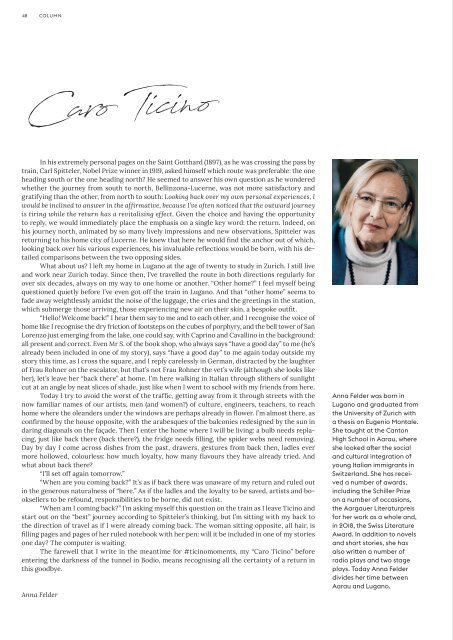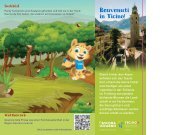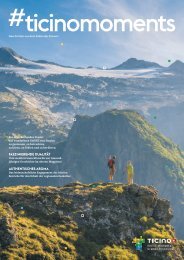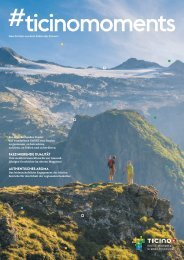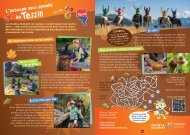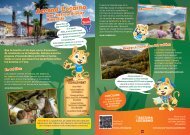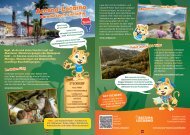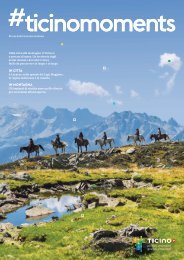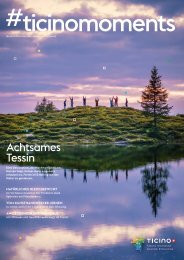#ticinomoments 2020
Create successful ePaper yourself
Turn your PDF publications into a flip-book with our unique Google optimized e-Paper software.
48 COLUMN<br />
Caro Ticino<br />
In his extremely personal pages on the Saint Gotthard (1897), as he was crossing the pass by<br />
train, Carl Spitteler, Nobel Prize winner in 1919, asked himself which route was preferable: the one<br />
heading south or the one heading north? He seemed to answer his own question as he wondered<br />
whether the journey from south to north, Bellinzona-Lucerne, was not more satisfactory and<br />
gratifying than the other, from north to south: Looking back over my own personal experiences, I<br />
would be inclined to answer in the affirmative, because I’ve often noticed that the outward journey<br />
is tiring while the return has a revitalising effect. Given the choice and having the opportunity<br />
to reply, we would immediately place the emphasis on a single key word: the return. Indeed, on<br />
his journey north, animated by so many lively impressions and new observations, Spitteler was<br />
returning to his home city of Lucerne. He knew that here he would find the anchor out of which,<br />
looking back over his various experiences, his invaluable reflections would be born, with his detailed<br />
comparisons between the two opposing sides.<br />
What about us? I left my home in Lugano at the age of twenty to study in Zurich. I still live<br />
and work near Zurich today. Since then, I’ve travelled the route in both directions regularly for<br />
over six decades, always on my way to one home or another. “Other home?” I feel myself being<br />
questioned quietly before I’ve even got off the train in Lugano. And that “other home” seems to<br />
fade away weightlessly amidst the noise of the luggage, the cries and the greetings in the station,<br />
which submerge those arriving, those experiencing new air on their skin, a bespoke outfit.<br />
“Hello! Welcome back!” I hear them say to me and to each other, and I recognise the voice of<br />
home like I recognise the dry friction of footsteps on the cubes of porphyry, and the bell tower of San<br />
Lorenzo just emerging from the lake, one could say, with Caprino and Cavallino in the background:<br />
all present and correct. Even Mr S. of the book shop, who always says “have a good day” to me (he’s<br />
already been included in one of my story), says “have a good day” to me again today outside my<br />
story this time, as I cross the square, and I reply carelessly in German, distracted by the laughter<br />
of Frau Rohner on the escalator, but that’s not Frau Rohner the vet’s wife (although she looks like<br />
her), let’s leave her “back there” at home. I’m here walking in Italian through slithers of sunlight<br />
cut at an angle by neat slices of shade, just like when I went to school with my friends from here.<br />
Today I try to avoid the worst of the traffic, getting away from it through streets with the<br />
now familiar names of our artists, men (and women?) of culture, engineers, teachers, to reach<br />
home where the oleanders under the windows are perhaps already in flower. I’m almost there, as<br />
confirmed by the house opposite, with the arabesques of the balconies redesigned by the sun in<br />
daring diagonals on the façade. Then I enter the home where I will be living: a bulb needs replacing,<br />
just like back there (back there?), the fridge needs filling, the spider webs need removing.<br />
Day by day I come across dishes from the past, drawers, gestures from back then, ladles ever<br />
more hollowed, colourless: how much loyalty, how many flavours they have already tried. And<br />
what about back there?<br />
“I’ll set off again tomorrow.”<br />
“When are you coming back?” It’s as if back there was unaware of my return and ruled out<br />
in the generous naturalness of “here.” As if the ladles and the loyalty to be saved, artists and booksellers<br />
to be refound, responsibilities to be borne, did not exist.<br />
“When am I coming back?” I’m asking myself this question on the train as I leave Ticino and<br />
start out on the “best” journey according to Spitteler’s thinking, but I’m sitting with my back to<br />
the direction of travel as if I were already coming back. The woman sitting opposite, all hair, is<br />
filling pages and pages of her ruled notebook with her pen: will it be included in one of my stories<br />
one day? The computer is waiting.<br />
The farewell that I write in the meantime for <strong>#ticinomoments</strong>, my “Caro Ticino” before<br />
entering the darkness of the tunnel in Bodio, means recognising all the certainty of a return in<br />
this goodbye.<br />
Anna Felder<br />
Anna Felder was born in<br />
Lugano and graduated from<br />
the University of Zurich with<br />
a thesis on Eugenio Montale.<br />
She taught at the Canton<br />
High School in Aarau, where<br />
she looked after the social<br />
and cultural integration of<br />
young Italian immigrants in<br />
Switzerland. She has received<br />
a number of awards,<br />
including the Schiller Prize<br />
on a number of occasions,<br />
the Aargauer Literaturpreis<br />
for her work as a whole and,<br />
in 2018, the Swiss Literature<br />
Award. In addition to novels<br />
and short stories, she has<br />
also written a number of<br />
radio plays and two stage<br />
plays. Today Anna Felder<br />
divides her time between<br />
Aarau and Lugano.


